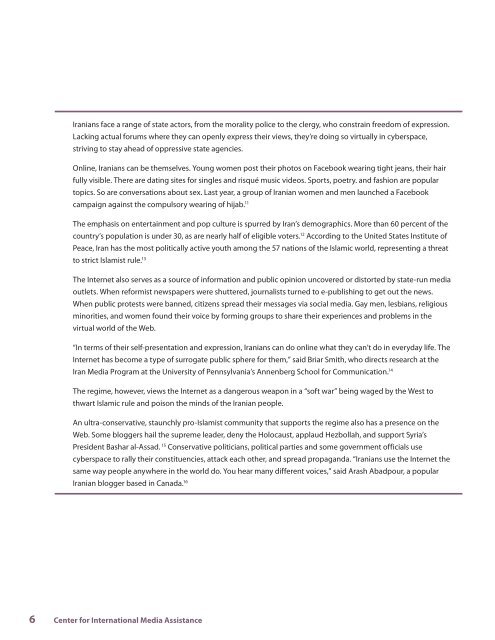CIMA-Iran
CIMA-Iran
CIMA-Iran
- No tags were found...
You also want an ePaper? Increase the reach of your titles
YUMPU automatically turns print PDFs into web optimized ePapers that Google loves.
<strong>Iran</strong>ians face a range of state actors, from the morality police to the clergy, who constrain freedom of expression.Lacking actual forums where they can openly express their views, they’re doing so virtually in cyberspace,striving to stay ahead of oppressive state agencies.Online, <strong>Iran</strong>ians can be themselves. Young women post their photos on Facebook wearing tight jeans, their hairfully visible. There are dating sites for singles and risqué music videos. Sports, poetry. and fashion are populartopics. So are conversations about sex. Last year, a group of <strong>Iran</strong>ian women and men launched a Facebookcampaign against the compulsory wearing of hijab. 11The emphasis on entertainment and pop culture is spurred by <strong>Iran</strong>’s demographics. More than 60 percent of thecountry’s population is under 30, as are nearly half of eligible voters. 12 According to the United States Institute ofPeace, <strong>Iran</strong> has the most politically active youth among the 57 nations of the Islamic world, representing a threatto strict Islamist rule. 13The Internet also serves as a source of information and public opinion uncovered or distorted by state-run mediaoutlets. When reformist newspapers were shuttered, journalists turned to e-publishing to get out the news.When public protests were banned, citizens spread their messages via social media. Gay men, lesbians, religiousminorities, and women found their voice by forming groups to share their experiences and problems in thevirtual world of the Web.“In terms of their self-presentation and expression, <strong>Iran</strong>ians can do online what they can’t do in everyday life. TheInternet has become a type of surrogate public sphere for them,” said Briar Smith, who directs research at the<strong>Iran</strong> Media Program at the University of Pennsylvania’s Annenberg School for Communication. 14The regime, however, views the Internet as a dangerous weapon in a “soft war” being waged by the West tothwart Islamic rule and poison the minds of the <strong>Iran</strong>ian people.An ultra-conservative, staunchly pro-Islamist community that supports the regime also has a presence on theWeb. Some bloggers hail the supreme leader, deny the Holocaust, applaud Hezbollah, and support Syria’sPresident Bashar al-Assad. 15 Conservative politicians, political parties and some government officials usecyberspace to rally their constituencies, attack each other, and spread propaganda. “<strong>Iran</strong>ians use the Internet thesame way people anywhere in the world do. You hear many different voices,” said Arash Abadpour, a popular<strong>Iran</strong>ian blogger based in Canada. 166 Center for International Media Assistance


